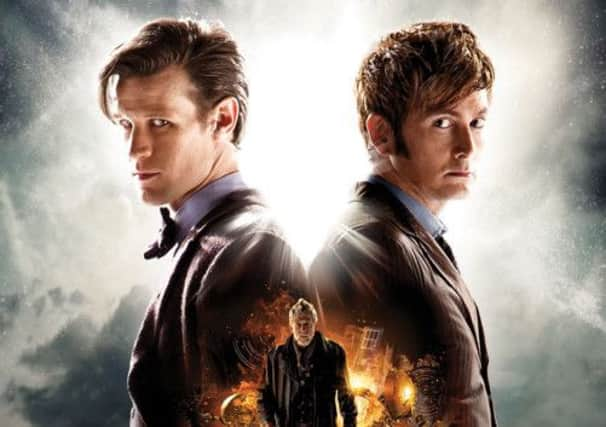TV Review: Doctor Who, Day of the Doctor


Would you visit the Stone Age or the far future, would you try to rewrite history, or meet famous characters? But once you grow up and acquire some regrets, the true answer, surely, is much simpler: you’d go back and do things right this time. You’d fix all your mistakes.
And so, in the end, that’s what the Doctor did to mark his 50th anniversary on our screens. The fundamental rule of the programme, sternly explained early on by the First Doctor, William Hartnell, has always been that once the adventure starts, there’s no going back and starting again; you have to play it out, whatever the cost. But the Doctor has never been very good at following rules.
Advertisement
Hide AdSince 2005, his biggest regret has been what Russell T Davies wrote in to give the revived series more depth: an unseen war crime when he wiped out both the Daleks and his own people, the Time Lords, in order to stop them destroying everyone else. In this 77-minute long special, written by current showrunner Steven Moffat, it was revealed that John Hurt – introduced briefly in May in The Name Of The Doctor as the missing link between Paul McGann and Christopher Eccleston – was the incarnation who pulled the trigger. The implications of this for the numbering scheme will doubtless have led to many happy arguments among fans last night.
For more casual viewers, all this will be alien. Why were there several versions of the Doctor jumping around between the Tower of London, Elizabethan times and his home planet of Gallifrey? Who were those shape-shifting aliens, like red rubber envelopes with a face (the Zygons) and why did they want to take over Earth? And how come Rose Tyler (Billie Piper) was back?
If baffled, best just to ascribe all the plot’s contradictions to “timey-wimeyness” – a phrase Hurt’s acerbic Doctor regarded with some scorn, wondering: “Do you have to talk like children? What is it that makes you so ashamed of being a grown up?”
Well, murdering millions of little Time Lord children, for one thing. He hadn’t done it yet, but Billie Piper – in her otherworldly Bad Wolf form – manifested out of a sentient weapon and showed him his two future selves. If David Tennant’s Tenth Doctor was “the man who regrets” and Matt Smith’s Eleven is “the man who forgets”, then Nine was the man who sent his regrets, with Eccleston declining to join the celebration. So Hurt, Tennant and Smith – dubbing each other “Granddad”, “Sandshoes” and “Chinny” – teamed up to defeat a centuries-long Zygon plot which involved hiding in 3D paintings – a nod to the simultaneous broadcasts in cinemas, some in 3D, as well as TV stations across over 90 countries. And then, together, they realised that they could use the same trick to rewrite their own history, saving Gallifrey in suspended animation somewhere. When Smith leaves at Christmas, his successor Peter Capaldi – who appeared very briefly in a montage as the incarnations pooled their resources – will take on the job of tracking down those frozen-in-Time Lords.
There was one last surprise: the return of a twinkling, white-haired Tom Baker – not as the Doctor, apparently, but “the Curator”, who told the Eleventh incarnation: “Oh, if I were you – but perhaps I was you, or perhaps you were me… who knows!” But, in retrospect, we should have seen it coming earlier in the programme when a female UNIT scientist turned up wearing a long, multi-coloured scarf in the style of the Fourth Doctor. Or, perhaps, when a blue police box in the Canonmills area of Edinburgh was wrapped in a similar huge scarf to mark the anniversary.
After 50 years, Doctor Who is so embedded into British culture that we all feel a sense of ownership: pleasing everyone is impossible. But with a combination of silly jokes, frantic babble, nods to the fans and, at its heart, a story about facing our own past regrets, this was an episode that will keep people talking until at least the 60th Anniversary.